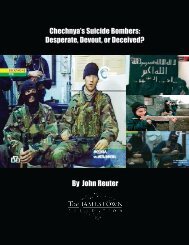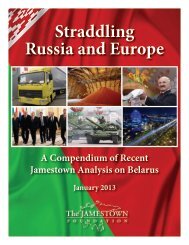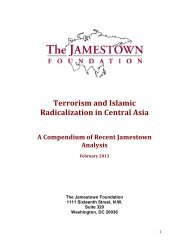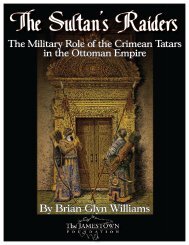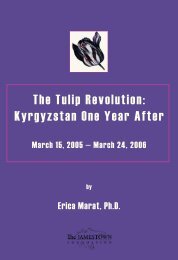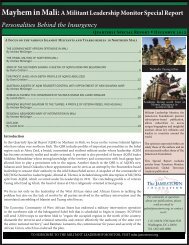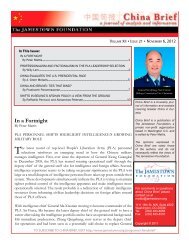The Zintan Militia and the Fragmented Libyan State
The Zintan Militia and the Fragmented Libyan State
The Zintan Militia and the Fragmented Libyan State
- No tags were found...
Create successful ePaper yourself
Turn your PDF publications into a flip-book with our unique Google optimized e-Paper software.
Hot Issue Jamestown Foundation u January 19, 2012denounced his appointment as “undemocratic” whilepromoting <strong>the</strong>ir own c<strong>and</strong>idate, General Salah Salemal-Ubaydah (AFP, January 3; Jeune Afrique, January13). General al-Mangush is determined to establish asupreme defense council <strong>and</strong> speed up <strong>the</strong> integration ofmilitia fighters into <strong>the</strong> national army <strong>and</strong> police, but hemay need a greater level of support than he has now tobe successful (Jeune Afrique, January 13).Libya’s Difficult TransitionIn political science, especially following <strong>the</strong> collapse of<strong>the</strong> Soviet Union, <strong>the</strong> term “transition” is mostly usedto define those political processes leading to a – more orless – effective (liberal) democracy. In Libya, at present,it is impossible to use transition in this meaning, as <strong>the</strong>first step to start a transition to democracy is to have agovernment capable of imposing its rule on <strong>the</strong> people<strong>and</strong> groups in its national territory. <strong>The</strong> 42 years of<strong>the</strong> Jamahiriya (<strong>State</strong> of <strong>the</strong> Masses) – a very personalQaddafi creation lacking institutions typical of modernstates – makes this an enormous challenge, even in <strong>the</strong>event of a scenario (at present completely detachedfrom <strong>the</strong> reality on <strong>the</strong> ground) in which everyone inLibya acted to meet <strong>the</strong> need to create a functioningstate without seeking to advance narrow <strong>and</strong> factionalinterests at <strong>the</strong> same time.<strong>The</strong> success of this transition is strongly connected tohow <strong>Libyan</strong>s will be able to manage <strong>the</strong> thorny issueof militias <strong>and</strong> <strong>the</strong> risk of starting a political shift towarlordism ra<strong>the</strong>r than democracy. <strong>The</strong> continuousclashes between different militias – <strong>the</strong> latest occurringin near Gharyan (50 miles south of Tripoli), involvinga militia from Gharyan pitted against ano<strong>the</strong>r militiafrom neighboring Assabia – are a powerful reminderof <strong>the</strong> menace <strong>the</strong>y pose to Libya’s increasingly volatile<strong>and</strong> fragmented security environment (Reuters, January14; AFP, January 16). One of <strong>the</strong> most important<strong>and</strong> well organized groups in present-day Libya is <strong>the</strong><strong>Zintan</strong> militia, which controls <strong>the</strong> Tripoli airport <strong>and</strong>o<strong>the</strong>r institutions in <strong>the</strong> capital. <strong>The</strong> group has been <strong>the</strong>protagonist in several political <strong>and</strong> security incidentsover <strong>the</strong> past few weeks.Moving on from <strong>the</strong> Jamahiriya <strong>State</strong>Libya as a unitary state has always been characterizedby several internal fault lines, with ethnic, tribal, cultural<strong>and</strong> political cleavages characterizing its political <strong>and</strong>social environment. <strong>The</strong>se fault lines were exploited byQaddafi during his rule. For example, in <strong>the</strong> very early2stages of his rule after <strong>the</strong> 1969 coup, Qaddafi tried todowngrade <strong>the</strong> importance of <strong>the</strong> tribes, but, after a fewyears he understood that it was impossible to maintaina strong grip on <strong>the</strong> country without <strong>the</strong> support of atleast some of <strong>the</strong> major tribes. <strong>The</strong> resulting “divide<strong>and</strong> rule” policy was a major feature of <strong>the</strong> Qaddafijamahiriya (state of <strong>the</strong> masses). In <strong>the</strong> long run,stressing <strong>the</strong>se divisions proved to be unsustainable <strong>and</strong>was a key factor in explaining <strong>the</strong> eruption of <strong>the</strong> revoltsin February 2011.It is no coincidence that <strong>the</strong> core of <strong>the</strong> revolt was <strong>the</strong>eastern city of Benghazi, <strong>the</strong> stronghold of <strong>the</strong> pre-Qaddafi Sanussi monarchy <strong>and</strong> <strong>the</strong> area most penalizedunder Qaddafi. <strong>The</strong> <strong>Libyan</strong> east-west divide is a longst<strong>and</strong>ing feature of <strong>the</strong> <strong>Libyan</strong> political <strong>and</strong> sociall<strong>and</strong>scape <strong>and</strong> is essential to underst<strong>and</strong>ing Libya’sfragmentation. <strong>The</strong> increasing weight of local, regional<strong>and</strong> tribal interests – which emerged clearly in <strong>the</strong>protests against <strong>the</strong> appointment of <strong>the</strong> new transitionalgovernment – is connected to this domestic cleavage.Though very important, this dynamic is only one ofmany working against <strong>the</strong> establishment of a unitarystate in Libya.<strong>The</strong> killing of Qaddafi was not only <strong>the</strong> symbolic endof an era but visible proof that his rule cannot returnto Libya. <strong>The</strong> psychological relief this provided hadano<strong>the</strong>r side to take into account; <strong>the</strong> death of <strong>the</strong>common enemy opened <strong>the</strong> underlying structuralfissions within <strong>the</strong> heterogeneous bloc of rebels whocarried out <strong>the</strong> revolution. In this context, <strong>the</strong> presenceof autonomous armed militias on <strong>the</strong> ground representsa major obstacle to <strong>the</strong> normalization of <strong>the</strong> <strong>Libyan</strong>security environment.Recent Clashes in TripoliAt <strong>the</strong> end of November, fighters of <strong>the</strong> <strong>Zintan</strong> militiastopped Abdulhakim Belhadj at <strong>the</strong> Tripoli airport,accusing Belhadj of travelling to Istanbul on a fakepassport. Only after a direct intervention from <strong>Libyan</strong>interim leader Mustafa Abdul Jalil was he able to catchhis flight (Tripoli Post, November 26, 2011). Belhadj,head of <strong>the</strong> Tripoli Military Council, a former leader of<strong>the</strong> <strong>Libyan</strong> Islamic Fighting Group (LIFG) <strong>and</strong> one of<strong>the</strong> most important figures in <strong>the</strong> anti-Qaddafi revolt, isconsidered to be one of <strong>the</strong> main enemies of <strong>the</strong> <strong>Zintan</strong>group. His military council presents a direct challenge to<strong>the</strong> <strong>Zintan</strong> Brigade in <strong>the</strong> struggle to control <strong>the</strong> securityof Tripoli. Like o<strong>the</strong>r militias active in <strong>the</strong> <strong>Libyan</strong>capital, establishing control over <strong>the</strong> city is considered
Hot Issue Jamestown Foundationu January 19, 2012to be a strategic necessity for <strong>the</strong>se groups to enable<strong>the</strong>m to advance <strong>the</strong>ir interests <strong>and</strong> agendas in <strong>the</strong> newpolitical balance. In this context, control of <strong>the</strong> airportis considered fundamental.<strong>The</strong> <strong>Zintan</strong> Brigade was <strong>the</strong> protagonist in ano<strong>the</strong>rincident at <strong>the</strong> Tripoli airport on December 10, 2011,when <strong>the</strong> militia was involved in a firefight with aconvoy carrying Major General Khalifa Haftar. Twomembers of <strong>the</strong> militia were killed <strong>and</strong> several injured(see Terrorism Monitor Brief, December 16, 2011).Khalid al-<strong>Zintan</strong>i, a spokesman for <strong>the</strong> <strong>Zintan</strong> militia,said that members of his group did not try to killHaftar <strong>and</strong> that clashes occurred simply because no onenotified <strong>the</strong> <strong>Zintan</strong> revolutionaries of Haftar’s intentionto travel to <strong>the</strong> airport (AP, December 11). Al-<strong>Zintan</strong>i<strong>and</strong> Mukhtar al-Akhdar, <strong>the</strong> comm<strong>and</strong>er of <strong>Zintan</strong>ifighters at <strong>the</strong> airport, criticized <strong>the</strong> nascent NationalArmy, of which Haftar is now <strong>the</strong> ex-comm<strong>and</strong>er-inchief,saying that <strong>the</strong> presence <strong>and</strong> influence of thisarmy on <strong>the</strong> ground is almost nonexistent <strong>and</strong> addingthat <strong>the</strong> <strong>Zintan</strong> Brigade will step down only once <strong>the</strong>new government authorities are able to fully guaranteesecurity in Tripoli. Only a few days later, <strong>the</strong> membersof <strong>the</strong> <strong>Zintan</strong> militia were involved in ano<strong>the</strong>r clashwith members of <strong>the</strong> neighboring Mashashiya, arresting20 members of <strong>the</strong> tribe, which was considered loyal toQaddafi’s regime (AFP, December 12, 2011).<strong>The</strong> <strong>Zintan</strong> <strong>Militia</strong> Benefits from Strong Organization<strong>The</strong> <strong>Zintan</strong> militia is named for <strong>Zintan</strong>, a city ofroughly 50,000 people in <strong>the</strong> Nafusa Mountainsof western Libya. <strong>The</strong> relationship of this city withQaddafi’s regime was always unsettled. Though locatedin that half of <strong>the</strong> country that benefited by <strong>the</strong> shiftin <strong>the</strong> political balances following <strong>the</strong> overthrow of <strong>the</strong>monarchy, <strong>Zintan</strong>is remained ra<strong>the</strong>r critical of Qaddafi<strong>and</strong> his Jamahiriya state. Some <strong>Zintan</strong>is participated in<strong>the</strong> failed 1993 coup against Qaddafi that was organizedby some members of <strong>the</strong> Warfalla, Libya’s largest <strong>and</strong>most powerful <strong>Libyan</strong> tribe <strong>and</strong> usually regarded as apower base for <strong>the</strong> Qaddafi regime (though this supportwas far from unanimous). <strong>Zintan</strong>i fighters joined <strong>the</strong>2011 revolution during its very early stages <strong>and</strong> wereresponsible for arresting <strong>the</strong> fugitive Saif al-IslamQaddafi in sou<strong>the</strong>rn Libya (Jeune Afrique, November30, 2011). <strong>The</strong> charismatic founder of <strong>the</strong> <strong>Zintan</strong>militia, Muhammad Ali Madani, was killed by loyalistforces on May 1, 2011 (al-Arabiya, September 7, 2011)3<strong>The</strong> <strong>Zintan</strong> Brigade has an inflexible approach in itsrecruitment procedures - only those who can fullydemonstrate that <strong>the</strong>y were not attached to <strong>the</strong> previousregime can join <strong>the</strong> group. As shown by <strong>the</strong> dispute with<strong>the</strong> Mashashiya, <strong>the</strong> <strong>Zintan</strong> Brigade has a more general,non-negotiable approach of rejecting any possibilityof collaboration with people attached to <strong>the</strong> previousregime.Ano<strong>the</strong>r characteristic of <strong>the</strong> <strong>Zintan</strong> militia is <strong>the</strong>irstrong <strong>and</strong> efficient organization, which allows <strong>the</strong>mto implement an effective control of <strong>the</strong> areas under<strong>the</strong>ir informal rule. Unlike o<strong>the</strong>r <strong>Libyan</strong> militias thatare composed mostly of civilian volunteers, <strong>the</strong> <strong>Zintan</strong>Brigade has a balanced but strictly hierarchical mix ofcivilian volunteers from <strong>Zintan</strong> <strong>and</strong> former membersof <strong>the</strong> <strong>Libyan</strong> national army who defected in <strong>the</strong> earlystages of <strong>the</strong> revolution <strong>and</strong> are now in comm<strong>and</strong>positions within <strong>the</strong> Brigade.It is not surprising that a member of <strong>the</strong> <strong>Zintan</strong> militia,Osama al-Juwali, was appointed Minister of Defense in<strong>the</strong> new transitional cabinet (al-Jazeera, November 22,2011). Unlike o<strong>the</strong>r members of <strong>the</strong> <strong>Libyan</strong> leadership,al-Juwali has opted for a milder approach towards<strong>the</strong> militias, aimed at integrating <strong>and</strong> co-opting <strong>the</strong>segroups. Al-Juwali says that time is needed to settlethis situation, without setting any deadlines. In mid-December al-Juwali suggested that six weeks was <strong>the</strong>minimum time needed in which to expect some resultsconcerning <strong>the</strong> normalization of <strong>the</strong> militias’ presence(Reuters, December 19, 2011). This stance is part of awider pragmatic approach pursued by al-Juwali, whowants to integrate militiamen in <strong>the</strong> new military <strong>and</strong>security services of <strong>the</strong> country. He stressed <strong>the</strong> factthat <strong>the</strong>se men represent those marginalized duringQaddafi’s era <strong>and</strong> will bring new blood into <strong>the</strong> <strong>Libyan</strong>security forces (al-Jazeera, December 26, 2011). In hisefforts, al-Juwali can count on his growing reputationwithin <strong>the</strong> revolutionary forces as a member of one of<strong>the</strong> most powerful <strong>Libyan</strong> militias with <strong>the</strong> support of awide network of personal relations within it.ConclusionApart from a powerful shared aim to get rid of Qaddafi,<strong>the</strong> various loose-knit groups of <strong>the</strong> rebel camp hadlittle in common, leaving a general feeling of mistrust<strong>and</strong> suspicion as <strong>the</strong> main denominators of <strong>the</strong>irrelationship. Every militia has its own self-narrative<strong>and</strong> myth concerning its role <strong>and</strong> weight in destroyingQaddafi’s Jamahiriya. As shown by <strong>the</strong> recent clashes
Hot Issue Jamestown Foundation u January 19, 2012in <strong>and</strong> around Tripoli, <strong>the</strong> ability to obtain a consensusamong <strong>the</strong> militias seems slight <strong>and</strong> <strong>the</strong> possibility that<strong>the</strong>se groups will voluntarily give up <strong>the</strong>ir arms <strong>and</strong> getout of <strong>Libyan</strong> streets appears to be remote. <strong>The</strong> <strong>Zintan</strong>militia is a ra<strong>the</strong>r powerful example of how muchmilitias matter in <strong>the</strong> current <strong>Libyan</strong> environment; wellorganized, tough, irreducibly anti-Qaddafi <strong>and</strong> even ina way reliable, <strong>the</strong>y patrol several areas of Tripoli <strong>and</strong>,although at odds with some residents <strong>and</strong> local groups,have been able to perform a more or less effective job ofcontrolling <strong>the</strong>ir districts. <strong>The</strong>ir role during <strong>the</strong> revolutionbought <strong>the</strong>m some credibility amongst ordinary <strong>Libyan</strong>s<strong>and</strong> o<strong>the</strong>r revolutionaries. With some o<strong>the</strong>r factions,however, relations remain tense, especially with groupsvying for control of Tripoli such as <strong>the</strong> Tripoli MilitaryCouncil, <strong>the</strong> Misrata militia <strong>and</strong> <strong>the</strong> National Army.Any state pretending to be effective <strong>and</strong> functioningcannot allow <strong>the</strong> presence of armed groups on itsterritory that act independently. <strong>The</strong> efforts of al-Juwali, a member of <strong>the</strong> <strong>Zintan</strong> group, will be aimed atintegrating, ra<strong>the</strong>r than marginalizing, <strong>the</strong>se militiamenin <strong>the</strong> new security structure of Libya. <strong>The</strong> presence of amilitia member in <strong>the</strong> position of Minister of Defense isa vivid demonstration of how much <strong>the</strong> militias matter.That <strong>the</strong> Minister is a member of <strong>the</strong> <strong>Zintan</strong> militiadisplays <strong>the</strong> importance of this group <strong>and</strong> suggests that<strong>the</strong> next political moves by <strong>the</strong> Transitional Governmentwill not be hostile to <strong>Zintan</strong>i interests.<strong>The</strong> presence of an enormous number of “liberated”weapons on <strong>the</strong> streets of Tripoli <strong>and</strong> <strong>the</strong> strongpossibility that not all <strong>the</strong> militias will be satisfied by <strong>the</strong>new political balance make <strong>the</strong> outcome of <strong>the</strong> processstarted by al-Juwali very uncertain. Optimism regardinga settlement of <strong>the</strong> militia issue in Libya in <strong>the</strong> shortterm appears to be unrealistic.Dario Cristiani is a PhD C<strong>and</strong>idate in Middle East<strong>and</strong> Mediterranean Studies at King’s College London.Previously, he has been a teaching fellow in PoliticalScience <strong>and</strong> Comparative Politics at <strong>the</strong> University ofNaples “L’Orientale” <strong>and</strong> a political analyst with <strong>the</strong>Power <strong>and</strong> Interest News Report (PINR).4





